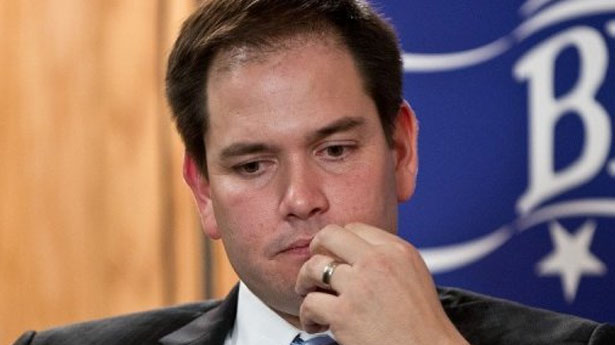PHOTO: Senator Marco Rubio: How will he assess a 5th-place finish in Republican primary in New Hampshire?
A very good night for Donald Trump, and a good one for John Kasich and Ted Cruz.
A bad night for Marco Rubio. Even worse for the Republican Party’s establishment.
That’s the immediate assessment after the results of Tuesday’s New Hampshire primary, in which businessman and TV reality star Donald Trump was far ahead with 35% of the vote. Ohio Governor John Kasich made himself a viable candidate with 16% for second place. Senator Cruz of Texas surpassed expectations to finish third with 12%.
In sharp contrast, Rubio, the US Senator from Florida who appeared ready for anointment as the “Establishment choice” after a strong performance last week in Iowa, has sunk amid a laughable disaster in last weekend’s debate. He finished at 11%, only just behind Cruz but also trailing former Florida Governor Jeb Bush.
See also US Analysis: Rubio 2016 Is Not Obama 2008
So what now? Heading to the next contests in the conservative states of South Carolina (February 20) and Nevada (February 23), it looks like five candidates remain.
Trump and Cruz have the advantage of passionate supporters and upcoming contests that favor their aggressive, right-wing political language. Meanwhile, the Republican Establishment looks dazed and confused. Do they look for a Rubio recovery? Do they see a possibility in Kasich, knowing that most of the contests through early March are in the South, where he has little recognition, let alone backing? Do they resort to a final attempt to resuscitate Bush?
At the least, this campaign continues well into the spring without a decisive victory. And — whisper it softly — but the US may be heading to its first party convention since 1952 in which no candidate has a first-ballot majority of delegates.
A Momentary Drama for the Democrats
A quick word about Bernie Sanders’ impressive victory over Hillary Clinton in the Democratic race, as the Senator from Vermont took 60% of the vote versus Clinton’s 38%.
It will be a moment of celebration for the progressive wing of the Democratic Party, and the US media will whip up the drama that Clinton is vulnerable.
That script will last until the next Democratic contests in Nevada (February 20), South Caroline (February 27), and the first rush of “Super Tuesday” contests on March 1. Sanders will struggle outside the northeast and some liberal bastions, and the Clinton and Democratic Party machine will roll when it’s a question of winning several battles in one day, rather than a one-off such as New Hampshire.

